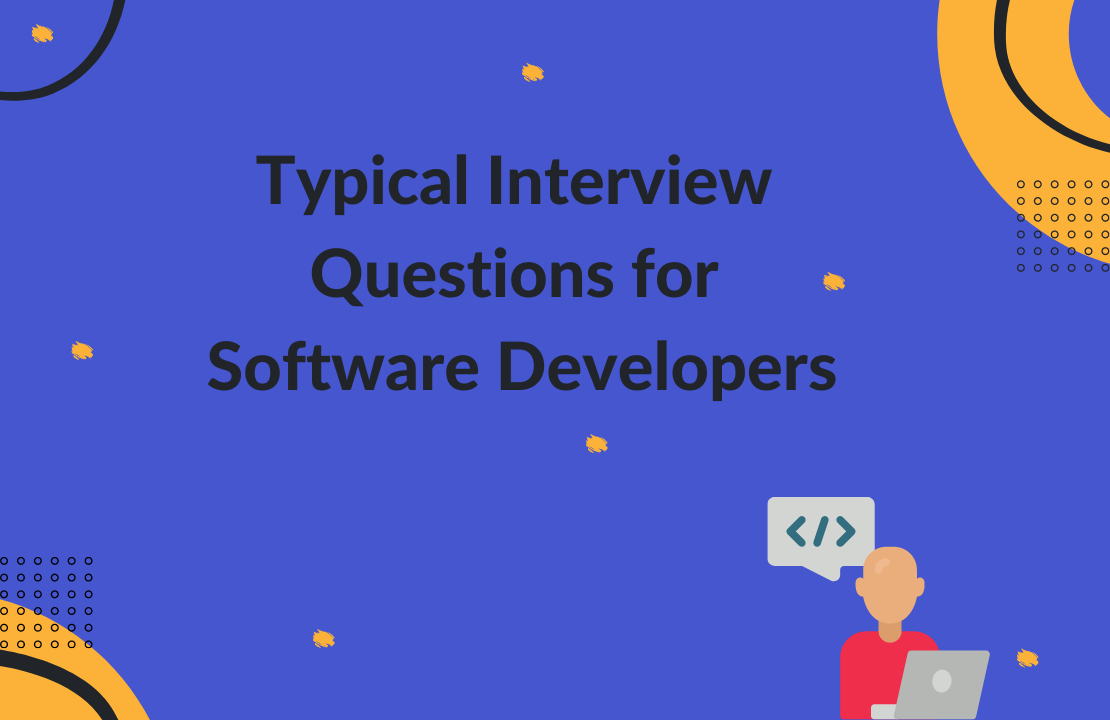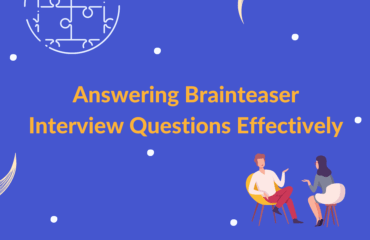Table of Contents
The 2022 job market offers great potential for Software Developers. According to a report, it is one of the jobs that is expected to grow the most this year. To take advantage of this favorable market, possessing the right skills and qualifications for the job may not be enough. Interview preparation is also a must. Familiarizing yourself with typical interview questions for Software Developers is one of the most effective ways to help you prepare and ace your upcoming interview.
What Skills do Companies Look for in a Software Developer?
Software Developers are typically hired in tech-heavy industries by large corporations or innovative start-ups to create robust software that meets their needs. When interviewing for this position, you will likely be asked a variety of questions about your technical and soft skills. Hence, understanding the skills employers look for in a Software Developer is essential. This can provide you with a clear overview of your relevant skills, allowing you to prepare your answers more effectively. Let’s take a look at some of the key competencies you need to succeed in a Software Developer role.
1) Hard or Technical Skills
a) Data Structure and Algorithms
Extensive knowledge of data structure and algorithms is the foundation of writing good code. It minimizes coding costs and improves data accuracy, which is the main objective of most organizations. Hence, being knowledgeable of data structure and algorithms, such as arrays, stacks, trees, linked lists, and queues can help boost your employability.
b) Programming Languages
As a Software Developer, a solid grasp of one or more programming languages is a must. You can specialize in any language based on the software you want to create or the type of industry you want to step in. JavaScript, Python, Ruby, C and C++, and PHP are some of the most in-demand programming languages you may consider mastering for your next Software Developer job.
c) Operating Systems (OS)
Creating applications for machines that rely on a specific OS is one of the key duties of a Software Developer. Hence, having a good understanding of the mechanisms of different types of OS is imperative. Some examples include Windows, Mac, Linux, Android, and iOS.
d) Database Management Systems (DBMS)
Databases are essential for software development. It’s where all important data related to the application is stored. Some of the top databases include Oracle, MySQL, MongoDB, IBM Db2, and Microsoft SQL Server.
e) Source Code Management Tools
Source Code Management Tools play a crucial role in managing, tracking, and recording changes to software code. It allows the development team to effectively collaborate on projects and make changes to the same code. Knowledge of these tools such as GitHub, Apache Subversion, Bazaar, and CVS can give you an edge over other candidates.
f) Testing Tools
Software products are typically subjected to a variety of tests to identify bugs and vulnerabilities that may impact performance. So, employers are on the lookout for Software Developers that are well-versed with different testing tools for diverse programming languages. Some of the top software testing tools that could be advantageous for your application include Testim, Kobiton, Mabl, Autfiy, and Global App Testing.
g) Software Development Lifecycle (SDLC)
SLDC provides an effective framework and method to develop software applications. Irrespective of the programming language you specialize in, you should know the tasks needed to be performed in each phase of software development. SDLC involves requirements collection, feasibility study, design, software development, testing, deployment, and maintenance and improvement.
2) Soft Skills
a) Communication
In order for you to work effectively with other people, you need effective communication skills. It allows you to convey complex ideas and concepts to the project team and stakeholders. Moreover, it’s also useful when writing documentation for frameworks and libraries.
b) Teamwork and Collaboration
The role of a Software Developer typically involves working with a team. You need to be able to work well with others to achieve the common goal of delivering a functioning software product. A cohesive team can reduce development time and prevent mistakes that might occur during project completion.
c) Detail-oriented
Software development requires a high level of attention to detail. You need to be precise and have a keen eye for discovering issues that could impact the application’s performance. Additionally, you need to be meticulous when going through your code to ensure alignment with project guidelines and requirements.
d) Multi-tasking
A Software Developer’s job usually involves working on multiple projects. Being able to multitask would enable you to balance competing demands of your time and meet tight deadlines without sacrificing work quality. In order to perform your job effectively, you need to be able to prioritize tasks and address the most critical demands first.
e) Problem-solving
Software development is more about solving problems than simply writing codes. In most cases, you will spend time debugging and correcting errors in the code that cause the application to malfunction unexpectedly. This requires strong problem-solving abilities.
Common Software Developer Interview Questions
To understand your fit for the role, the interviewer may ask you questions about your personality, motivation, competencies, behaviors, and work experiences. Gauging and preparing for the potential interview questions the hiring manager might ask can help improve your confidence and performance. In this section, you will find some of the typical questions you might face during your interview.
1) Typical Technical Interview Questions
These types of questions help decision-makers understand your technical knowledge and abilities. So, make sure you understand the specific technical skills required by your potential employer and identify the ones you have, as well as related experiences and achievements. Here are some of the questions you need to prepare for.
a) How do you go about finding repeated characters on a string in [insert programming language]?
This is a type of data structure-based question that is expected of every developer to know how to solve. Employers use this question to gauge whether the candidate has the basic technical skills to perform the job well. An interviewer may ask you to briefly explain how you would go about finding repeated characters on a string in a specific language. In other cases, an interviewer might give you a problem to solve where you will be required to write and explain your solution.
To prepare for this type of question, a basic knowledge of data structure and algorithms is a must. If you need to improve your understanding of this, there are online resources that you can check, such as Udemy and Coursera. Apart from this, identifying the programming language on which the job relies heavily will also be beneficial.
b) What programming languages do you work in?
Interviewers ask this question to know the programming languages you’re fluent in. This helps them determine if you have the coding skills needed to do the job or the level of training you would need if hired. We suggest providing a specific example of a successful software development project you delivered. Highlight the coding languages and technology stack you used. Then, close off by mentioning how your expertise benefited the project completion.
c) What is your process to test and find bugs in software?
Testing is typically expected in software development. It needs to be carried out at all stages of development to determine whether the software satisfies the specified requirements or not. When providing your answer, use an example from your previous job where you conducted a set of tests and assessments at various development stages. Focus on the strategies you used and how your work contributed to ensuring a quality and defect-free system.
d) What has your experience been like as a part of an agile software development process, if any?
The interviewers ask this question to help them understand how you will fit into their own process. This is a great opportunity to demonstrate your flexibility and willingness to consider new ideas. You could get extra points for providing specific examples from your previous role where you identified flaws in an agile process and recommended a solution. Then, highlight how your recommendation contributed to improving the team’s methodology.
e) Can you tell me a bit about the latest software development project you worked on?
Interviewers use this question to get an insight into your overall contribution to the project, your management abilities, and how you work with a team. To stand out in an interview, we recommend giving an example of a project that you’ve delivered successfully. Then, elaborate on the high-level steps you’ve implemented to manage roadblocks and complications. Furthermore, don’t forget to speak about the results you’ve achieved.
f) Here is a simple programming challenge. Can you find and fix the error in this code?
Coding challenges are used by employers as a part of the interview process to assess your experience as a Software Developer. It also gives them an opportunity to see how well you work under pressure, which is crucial to the role. So, make sure to familiarize yourself with the programming language that your prospective employer uses. When preparing for an interview, you can use online coding websites to practice and keep your programming skills sharp.
g) Can you describe what a Software Development Life Cycle (SDLC) is?
SDLC is central to designing and building high-quality software products. Apart from describing what it is, we also suggest using an actual example from your previous role that demonstrates your expertise in the subject. Focus on the strategy you used to ensure that best practices and defined plans are followed across all stages of the development. Moreover, talking about how your work contributed to producing high-quality software while reducing cost and timeliness can be a great way to showcase the impact you’ve made.
2) Typical Soft Skills Interview Questions
While a Software Developer’s duties are primarily technical, soft skills are also important to thrive in the role. So, employers may ask interview questions that will help provide them with further insights into your personality, strength, competency, and behavior. Here are some of the questions you might face.
a) Describe a development issue you faced and how you solved it.
Software development is not always smooth sailing. You are likely to face issues along the way. Interviewers use the above question to understand how you deal with challenges and fix the problem. To answer this question, talk about a specific development issue you faced at work. Detail the problem-solving methods you used and the key steps you’ve taken to rectify the issue. Lastly, finish your answer with the outcome of your efforts.
b) How would you explain the technical elements of your work to a non-technical person?
Apart from the technical staff, a Software Developer may also interact with non-technical leaders and stakeholders to get buy-in. Hence, being able to communicate effectively is one of the most essential skills a developer should have. Interviewers ask this question to help them assess how you handle difficult conversations.
An ideal answer should demonstrate your ability to translate complex technical concepts into simple terms to help a non-technical person understand. As a rule of thumb, use terms and examples that are more relatable to your audience. For instance, you can use the term ‘website’ instead of ‘web-based system’ or ‘desktop software’ instead of ‘software library’.
c) What software products are you excited about, and why do you think they’ll survive in the next decade?
In addition to your ability to perform the job well, employers are also on the lookout for candidates who are passionate about the job. This type of question allows interviewers to gauge your passion for software development and emerging technologies, as well as your strategic vision for the future of software development. To answer the question, we recommend choosing a specific software product, describing it, and providing reasons why it might outperform other products.
d) Tell me about an instance when you disagreed with your manager.
When you’re asked this question, employers are looking to understand how you stand up for what you believe in while being respectful. The best way to answer this question is to share a story where you had a misunderstanding with your boss and you were right about the disagreement. Detail the conflict resolution tactics you’ve used and how you were able to establish consensus and maintain a good relationship.
The interviews for Software Developers are generally highly-technical with a focus on specific technologies. While the top skills and interview questions outlined above will benefit your interview preparation, it is also essential to do your own research and familiarize yourself with the technologies that the role heavily relies on. Most interview questions are designed to identify these skills in a candidate. If you need a professional guide to interviewing, you can always reach out to us for help.











